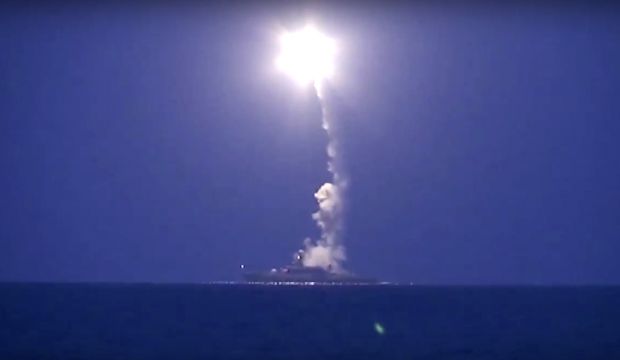
In this photo made from the footage taken from Russian Defense Ministry official web site on Wednesday, October 7, 2015, a Russian navy ship launches a cruise missile in the Caspian Sea. (Russian Defense Ministry Press Service via AP)
The combined operation hit towns close to the main north-south highway that runs through major cities in the mainly government-held west of Syria, said the Syrian Observatory for Human Rights, a British-based group which tracks the conflict via a network of sources within the country.
Ground attacks by Syrian government forces and their militia allies using heavy surface-to-surface missile bombardments hit at least four insurgent positions and there were heavy clashes, the head of the Observatory, Rami Abdulrahman, said.
The Iranian-backed Hezbollah militia took part in the fighting, according to a regional source who is familiar with the military situation in Syria.
Abdulrahman said later there was no sign that Syrian troops and their allies had made any tangible advances on the ground.
They briefly entered one town, but were forced to pull back, he said, and around 15 of their tanks or armored vehicles had been either destroyed or disabled.
Islamic State of Iraq and Syria (ISIS) militants have seized much of Syria since civil war grew out of anti-government protests in 2011, but the areas targeted in Wednesday’s combined assault are held by other rebels, some US-backed, fueling accusations by Russia’s critics that its real aim is to help the government.
Moscow says it shares the West’s aim of preventing the spread of ISIS, and Russian Defense Minister Sergei Shoigu told President Vladimir Putin during a televised meeting that four Russian warships in the Caspian Sea had launched 26 missiles at ISIS in Syria earlier in the day.
The missiles would have passed over Iran and Iraq to reach their targets, covering what Shoigu described as a distance of almost 1,500 km (900 miles), the latest display of Russian military power at a time when relations with the West are at a post-Cold War low over Ukraine.
The air campaign in Syria has caught Washington and its allies on the back foot and alarmed Syria’s northern neighbor Turkey, which says its air space has been repeatedly violated by Russian jets.
Ankara summoned Russia’s ambassador for the third time in four days over the reported violations, which NATO has said appeared to be deliberate and were “extremely dangerous”.
Turkey said Syria-based missile systems harassed its warplanes on Tuesday while eight F-16 jets were on a patrol flight along the Syria border.
Iraq looks to Russia
Syrian state television quoted a military source as saying the missiles fired by Russian ships targeted 11 ISIS positions in Raqqa, Aleppo and Idlib.
The missiles destroyed bomb-making factories, command posts, weapons and ammunition and fuel depots, as well as “terrorist training centers”, the TV said.
Russian air strikes destroyed the main weapons depots of a US-trained rebel group, the Liwa Suqour Al-Jabal, their commander said.
In conversation with Shoigu, Putin said it was too early to talk about the results of Russia’s operations in Syria and ordered his minister to continue cooperation with the United States, Turkey, Saudi Arabia, Iran and Iraq on the crisis.
US Defense Secretary Ash Carter said the United States would not cooperate militarily with Russia in Syria, although it was willing to hold discussions to secure the safety of its own pilots bombing ISIS targets in Syria.
The Pentagon said US-led coalition aircraft bombing ISIS in Syria had been re-routed at least once in the last six days to avoid a close encounter with Russian planes.
Turkish Prime Minister Ahmet Davutoğlu said only two of 57 Russian air strikes in Syria so far had hit ISIS, while the rest had been against the moderate opposition, the only forces fighting the hard-line insurgents in northwestern Syria.
But in Iraq, the head of parliament’s defense and security committee said Baghdad may request Russian air strikes against ISIS on its soil soon and wants Moscow to have a bigger role than Washington in fighting the group.
Iraq’s government and powerful Iranian-backed Shi’ite militias question the United States’ resolve in fighting ISIS militants, who control a third of the country, saying US-led coalition air strikes are ineffective.
The Kremlin said it had not received any official request from Iraq for air strikes against ISIS there.
